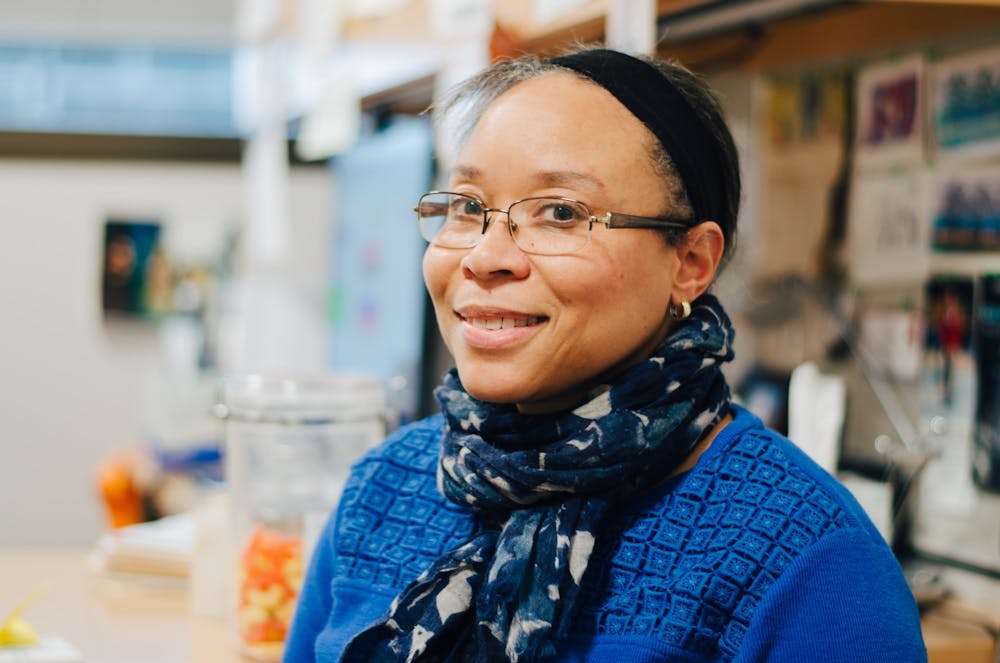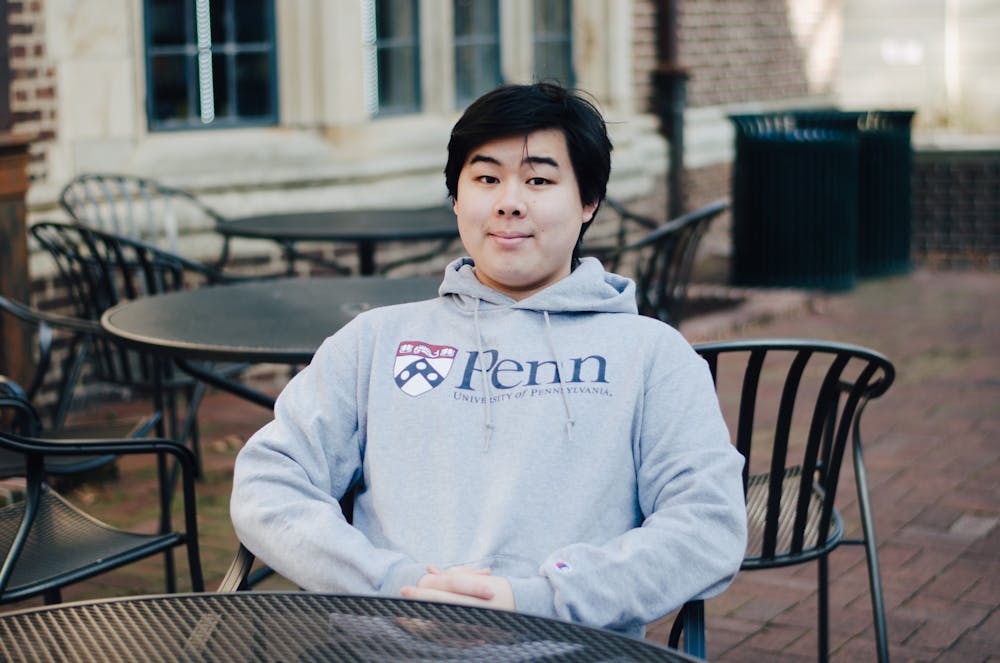I couldn’t stop biting my fingers the first time I went to CAPS. It’s a nervous habit I’ve had for as long as I can remember. I pick at the skin around my nails when I do my homework, send an important text, prepare for an interview—anything that makes me stressed, anxious, or afraid of failure.
Going to CAPS for the first time last fall made me feel all three. As I sat in the lobby surrounded by stress balls and tissue boxes, waiting to be called for my intake appointment, I felt like I’d failed college.
“Chelsey?” I turned in my seat and saw my counselor waving at me. I followed him down the hallways and into his office, where he asked me to take a seat and answer some brief questions: name, year, major, home, family history. Then he asked me why I came to CAPS, and, to my surprise, I started crying.
My hometown and friends I’d known for half my life were hundreds of miles away. After more than a year, I was still struggling with adjusting socially to Penn, even though it seemed like everybody else had already figured it out. I didn’t know how to balance school, work, and relationships. And despite having loving friends on campus, I felt incredibly lonely.
My counselor recommended group therapy. I wanted to say no at first. I already felt so embarrassed talking about my problems to one person, and thinking about opening up to even more strangers terrified me.
But group therapy turned out to be exactly what I needed to confront my issues with relationships and self-esteem. Sitting down with the same seven people every week gave me a comforting routine, time to reflect on my emotions, and practice with supporting others in their struggles. I gained a lot from group, but the most powerful for me was the feeling of being less alone.
CAPS has three different types of groups for students: workshops, support groups, and interpersonal growth groups (IGG). Workshops, which can range from a one-time meeting to a series over several weeks, coach students on developing skills to promote academic success, mindfulness, and overall wellness. Support groups run for the entire semester and focus on specific issues like grief or body image. IGGs, which also last for the entire semester, explore how each person interacts socially and discuss ways to improve personal relationships, allowing students to use the group as a safe space to practice connecting with others.
Although all groups feature “some degree of sharing,” according to Michele Downie, group coordinator at CAPS, support groups and IGGs differ in goals and structure from workshops.

Workshops typically have a more structured setup, with one or two CAPS staffers teaching specific lessons and leading discussions. They also vary more widely in participation. According to Downie, support groups and IGGs have only five to nine students on average, and they follow a looser format led by the students. One or two therapists still act as leaders in the conversation, but “ideally with the support and IGGs, students should be doing more of the talking than the leaders,” says Downie.
“It's not like each person has to speak each week, and you don't have 10 minutes that’s your time on the spot,” she says. “It mirrors how we engage in real life with people … There’s opportunities for people to build upon what each other is sharing and different experiences. It’s like real life but in a safe space where it feels like maybe you can take risks that you don’t feel ready for outside of the group setting.”
Working with peers and taking risks, which can take the form of sharing a secret or asking for advice, are a few ways in which group provides opportunities that are not always available in individual therapy.
Senior Clinical Director Michal Saraf believes another benefit is meeting people from different backgrounds who may provide unique perspectives to certain issues. Mirroring the diversity of experiences at Penn, students in group often come from varying cultures, nationalities, fields of study, and even age groups, as students from many schools and many stages of education all find help at CAPS.

“I think it helps people to understand that there's very rarely a right way to manage an emotional challenge or a life challenge,” Saraf says. “And I think sometimes among Penn students, there's a thought of, ‘Am I doing it the right way?’ Group is a great invitation to see that there are many ways, and you have to find the right way for you.”
And unlike individual therapy offered at CAPS, which is “brief” in nature due to the high volume of students needing counseling, group programs happen every semester, and there’s no limit to the number of times someone can participate. Downie says she has seen students stay in the same group for two or three years at a time.
“Changing how we are and how we engage is not easy,” says Downie. “I like to think of [group programs] as opportunities for continual growth in those spaces. From semester to semester, students return, and they sort of build upon the work that they did in previous semesters.”
My therapist recommended that I join an IGG. My first session was incredibly awkward. Five other students, our two group coordinators, and I filed into a room and sat in a circle facing each other. I avoided eye contact with the person across from me. After introductions, our coordinator explained that we would lead the conversations at each meeting, deciding what topics to cover and for how long.
“So what do you want to talk about today?” she asked us.
Silence. Nobody wanted to go first. In the hour-and-a-half we were there, there was probably more silence than actual words. As I stepped through the glass door and onto Market Street after the meeting, I thought, "What if this doesn’t work?"
I went back the next week. And the next. And I actually learned to love the silence. Outside of group, I constantly worried about what I said to people, how I said it, and whether people cared. Through group, I had a set time every week to reflect on how I was feeling, and I didn’t feel like I had to say things exactly the right way—or say anything at all.
Silence was freeing. Without outside pressures, the other students and I actually worked up the courage to talk surprisingly quickly. In a space where I didn’t have to hide my feelings or fear being judged, I could give voice to thoughts I’d always been too afraid to say out loud: that I was an uninteresting person, that my friends didn’t like me, and that I didn’t belong at Penn. And saying them out loud made me realize they only had power in my head. The people in group sympathized without judgement, and they assured me my greatest fears weren’t my reality.
I remember that I used to be really uncomfortable with the idea of therapy. I’d always thought my problems weren’t real, and that if I told anyone, they would say I was sad over nothing. I felt guilty asking for help because I thought I didn’t deserve it.
Group therapy helped shift my mindset. Instead of walking around with a hundred different worries in my head, I could let them go and listen as others around me related to my experiences. And being able to listen to and support others in their struggles made me feel less guilty about taking up space. I got to help others at the same time they were helping me.
Most importantly, group therapy made me realize I wasn’t the only person at Penn who felt lonely. This isn’t a huge revelation, but viewing other people’s lives from the outside, especially through Instagram posts and Snap stories, had convinced me that almost everyone around me had a nonstop social life. For the first time, I heard other students say they found it hard to meet new people, start conversations, and maintain friendships.

Bryan Denq
Realizing he wasn’t the only person struggling was one of the biggest benefits of group for Bryan Denq (C ‘22). He was a first-semester first year when he saw a poster in his dorm advertising Discover Your Well, a weekly workshop that uses positive psychology to help students “build optimism and hope,” “experience positive emotions,” and “nourish self-compassion.”
“Like most students, I come from a very stressful background,” he says. “Most people had to work really, really hard to get there, and I was one of those people. And to be frank, I did not want to relive that high stress level lifestyle again here at Penn.”
Bryan hoped to better equip himself for a positive college experience through the workshop.
He and three other students learned about mindfulness and self-esteem from two CAPS staffers before transitioning into a discussion-based format every meeting. Although he initially felt uncomfortable sharing personal stories in a group setting, Bryan says being able to relate to other people was a powerful experience.
“When I interact with most people, they think they are the only ones who can be suffering, like everyone else seems to be having a good time and managing their own workload,” he says. “On the other hand, I can't seem to handle what I'm doing right now. But going to these group workshops just opens your eyes, saying, ‘You are not alone. We all have these struggles, and we are trying to get through them as best as we can.’”
Although the workshop was especially helpful to him as a first year, Bryan believes that anyone, even seniors and postgraduate students, can benefit from being in a group like Discover Your Well. More than a year later, he still incorporates the lessons he learned about stress reduction, grit, and perseverance into his daily life.
But despite the benefits of group and its similar effectiveness when compared to individual therapy, Downie and Saraf agree that it’s an “underused” resource at CAPS due to a few common misconceptions.
“I think the first misconception is that group is not a good form of treatment or a good form of therapy,” Downie says. “There's a lot of research that for years, like decades of research, indicating that group is at least as effective as individual. And for certain things, particularly for certain age groups, like teenagers and college students, it can actually be more effective.”
Downie also believes that people are afraid of going to group because they think they have to share extremely personal experiences, even though there is no actual expectation for them to do so.
“I think it's actually very important for students to feel like they can take things at their own pace when they come into group and have control over how much they disclose, what they share about themselves,” she says. “It's a much slower, more comfortable process that is really very self determined.”
The open and informal structure of group therapy has helped me and many others manage our emotions better, but I want to make it clear that group therapy isn’t an end-all cure-all. For a while, I still went to individual therapy to sort out issues I wasn’t comfortable bringing up to the group. And even after attending a semester’s worth of meetings, I still worry too much and find it hard to stop comparing myself to other people.
Even though it wasn’t perfect, group therapy was a powerful reminder that I wasn’t alone. My loneliness initially pushed me to seek treatment, and it also fed my fear of vulnerability when I first joined the group. But working with others who struggled with the same fears taught me how to open up to strangers and identify irrational thought patterns. Group therapy didn’t fix all my problems. But it gave me the tools I needed to manage them.
